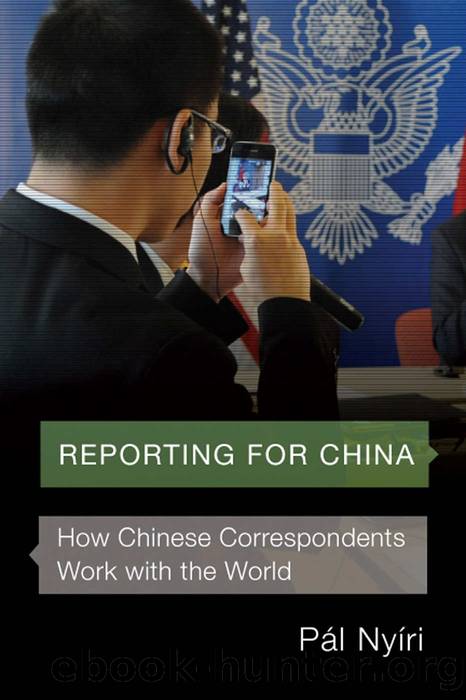Reporting for China: How Chinese Correspondents Work with the World by P�l Ny�ri

Author:P�l Ny�ri [Ny�ri, P�l]
Language: eng
Format: azw3
Publisher: University of Washington Press
Published: 2017-04-30T16:00:00+00:00
RUNNING YOUR OWN SHOP
Tom picks me up at 9:00 a.m. at my hotel in the capital of a small African country with a troubled history of relations with the West and strong ties to China. We end up spending the better part of the day together driving around the city. I remark that the place does not feel as sinister and the repression is not as obvious as I would have expected from Western media reports. Although I mean it, the remark is also intended as bait. Will Xinhuaâs local chief, in a city where no other major news agencies are present, rise to the occasion and complain about Western media bias in the way Annie did? But Tom makes a face and shakes his head skeptically. He acknowledges that there are opposition posters in the street, but says that many people are very careful of criticizing the government when he interviews them.
Tom joined Xinhuaâs Foreign Department in the mid-2000s as a fresh foreign language graduate of a prestigious Chinese university. His first job, as with most new recruits, was âtranslation and editingâ (bianyi), a term that refers largely to the rewriting of reports in other media, with some occasional interviewing. He was posted to Africa as bureau chiefâalbeit at a bureau whose only other Chinese staff member is Tomâs wife, for whom this is the first time overseas after a period of bianyi work. Like Annie, Tomâs wife, Wu Fei, underwent six months of âsocializationâ at a Xinhua bureau in one of Chinaâs northern provinces as a âfrontline journalistâ (yixian jizhe), a term originally derived from the Maoist vocabulary of class struggle but that now means more something like âgetting oneâs feet dirty.â Such tours of duty have recently been made mandatory for all prospective foreign correspondents. Some appreciated theirs and saw it as a valuable introduction to real reporting work; others saw it as akin to the ârusticationâ of educated youth during the Cultural Revolution, designed, in the words of a critical Xinhua editor, to âget rid of the foreign bullshitâ they had been taught in college.
Tom, as a journalist with some seniority compared to Annie, had some room to negotiate his posting. He chose this location over one in Northern Europeâwhich he was afraid would be too cold, empty, and lacking in newsâand Cairo, which he decided against because that would have been at a regional bureau, âtoo close to the lingdao.â Here, Tom is his own master, and, since it is considered a hardship post, he and his wife can apply to go home after two years instead of four. Another argument they can throw in for an early return is that they plan to have a child, and Xinhua has an unspoken rule against staff having children abroad. Once the child is born, foreign postings will become tricky because if he or she is to have any chance of success in university entrance examinations, the child will have to attend school in China.
Although making a
Download
This site does not store any files on its server. We only index and link to content provided by other sites. Please contact the content providers to delete copyright contents if any and email us, we'll remove relevant links or contents immediately.
| Africa | Americas |
| Arctic & Antarctica | Asia |
| Australia & Oceania | Europe |
| Middle East | Russia |
| United States | World |
| Ancient Civilizations | Military |
| Historical Study & Educational Resources |
The Story of China by Michael Wood(952)
Mr. Selden's Map of China by Timothy Brook(810)
Philippines--Culture Smart! by Culture Smart!(711)
Heroic Hindu Resistance To Muslim Invaders (636 AD to 1206 AD) by Sita Ram Goel(689)
Akbar: The Great Mughal by Ira Mukhoty(672)
Vedic Physics: Scientific Origin of Hinduism by Raja Ram Mohan Roy(663)
The Meaning of India by Raja Rao(662)
Food of India by unknow(661)
First Platoon by Annie Jacobsen(660)
Banaras by Diana L. Eck(648)
India--Culture Smart! by Becky Stephen(628)
China Unbound by Joanna Chiu(628)
North of South by Shiva Naipaul(626)
Mao's Great Famine: The History of China's Most Devastating Catastrophe, 1958-1962 by Frank Dikötter(608)
Insurgency and Counterinsurgency by Jeremy Black(595)
The Genius of China: 3,000 Years of Science, Discovery, and Invention by Robert Temple(592)
How to Be a Modern Samurai by Antony Cummins(584)
A History of Japan by R.H.P. Mason & J.G. Caiger(582)
The Digital Silk Road by Jonathan E. Hillman(580)
